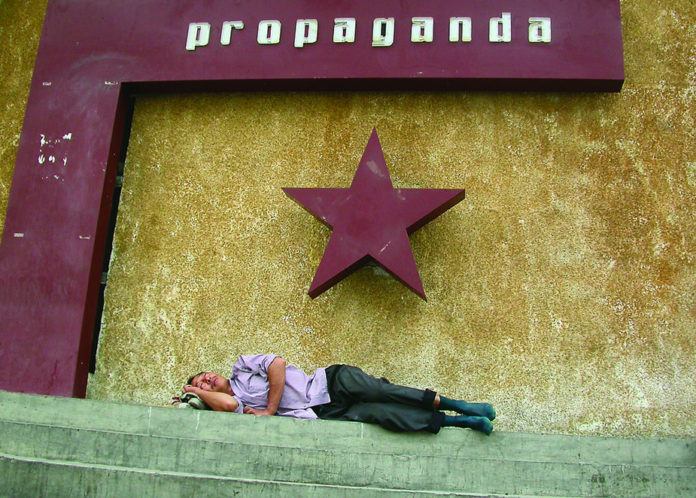
By Cristina Archetti, University of Salford
ISIS is winning the propaganda war, it’s been said, and top brass from the European Commission, EU member state governments, and representatives of Google, Facebook, Twitter and Microsoft have met to discuss what to do about extremist online content. They have yet to announce their decision, but it’s likely to involve some form of content blocking.
In fact extremist material is already being removed – David Cameron earlier this year spoke of steps he would take to do so, while the home secretary, Theresa May, confirmed that 28,000 pieces of online terrorist material had been removed.
But how far down the line of deletion and blocking online content can we go? To do so raises thorny questions that offer no clear answers: what counts as “extremist”? Is restricting access to information not an infringement of democratic freedoms? What role does online radical material really play in the process of radicalisation and is blocking it really justified?
My argument is that blocking online content is wrong. Preventing access to information violates basic freedoms that – particularly in a context in which there is no consensus about what constitutes either “extremism” or “terrorism” – could slip into censorship.
As an illustration of this point, after the video showing James Foley’s murder was released, Scotland Yard warned that viewing, downloading or disseminating the material “may constitute an offence under terrorism legislation”. When challenged, the police were unable to back up their position.
In any case, blocking radical material is the wrong step to take. It simply makes no sense when examining the alleged impact of social media and internet propaganda on audiences.
Social platform for poisonous ideology
It’s true that any message on the internet is available, in principle, to huge international audiences. But just because a jihadist video is available online doesn’t necessarily mean anyone is watching it. Compare the number of Twitter followers you have to Justin Bieber’s (55.6m) and it’s easy to realise that global notoriety online is only potential.
And we don’t pay attention to everything out there. According to estimates there are six billion hours of footage watched on YouTube alone each month. In such a deluge of available material we tend to pay attention to what we are interested in. This means that extremist propaganda, unless we look for it, simply flies over our heads with virtually everything else we are not concerned about.
Reach, in turn, does not translate into impact – not everyone that watches a jihadist video becomes an extremist. Politicians talk about the extremist positions of ISIS as a “poisonous ideology” with the potential to “infect” those exposed to it. But this is an extremely simplistic way of conceiving media effects.
A message, whether an incitement to violent jihad or to eat five fruit and veg a day, is not a virus. Neither are people passive sponges who merely absorb whatever ideas they come across. If that was the case we’d buy everything and anything any advert urges us to. The fact that the more most people encounter extremist propaganda the more they detest the ideology it represents, suggests we are not powerless receivers but active interpreters of media messages.
Radical in whose eyes?
Defining what counts as radical is problematic: we might agree that inciting murder is radical, but what about encouraging citizens not to vote? No spilling of blood involved there, but opposing the essence of democracy is fairly radical – who is to decide?
One doesn’t need to be exposed to radical messages to become radicalised. The case of Ed Hussain, a former British Islamist who became interested in political Islam after reading a school textbook, is just one example of the creativity of audiences in actively interpreting messages. Hussein drew his own extremist conclusions from non-radical material that countless other individuals had been exposed to without becoming radicalised. From this standpoint, we’d end up banning virtually everything.
There are those who would suggest that the number of fighters travelling to Iraq and Syria is proof that ISIS propaganda works. According to the EU’s anti-terrorism chief, more than 3,000 Europeans have travelled to fight in Syria and Iraq. Although this phenomenon is described as “unprecedented”, we need only look back to the Spanish Civil War (1936-39) to see how many thousands of volunteers were attracted from across Europe to fight on both sides.
For Franco’s nationalists there were 8,000 Portuguese, 700 Irish, 250 French, 78,000 Moroccans, 3,000 fighters from countries as diverse as the UK and Brazil. Some 30,000 more joined the Republican side, including a young George Orwell. Or consider the more than 210,000 Irish volunteers who fought with the British in World War I.
While recruitment propaganda was a contributing factor to enlisting volunteers in past conflicts (showing that the internet is really no more effective than the good old poster), we do not dismiss those volunteers’ motivations for joining foreign conflicts as the mere effect of “brainwashing”.
Tough question
There can be no technologies nor messages that are radicalising per se and that warrant being banned. Calls to join a conflict, regardless of the medium, tend to be heard by those that wish to listen and who, as a result of reasons specific to each individual, decide to commit themselves to the cause.
Before considering whether blocking content damages democracy – it would – instead ask who stands to gain. A politician is, essentially, a manager who wishes to solve problems with the minimum amount of effort and resources. It’s easy to blame technology, just as Hitler blamed allied propaganda for Germany’s defeat in 1918, but technology does not radicalise people. The important question we should ask is one far harder to answer: why do (mostly) young people find fighting and dying in a foreign land a preferable option to living in our society?
![]()
Cristina Archetti does not work for, consult to, own shares in or receive funding from any company or organisation that would benefit from this article, and has no relevant affiliations.
This article was originally published on The Conversation.
Read the original article.




















